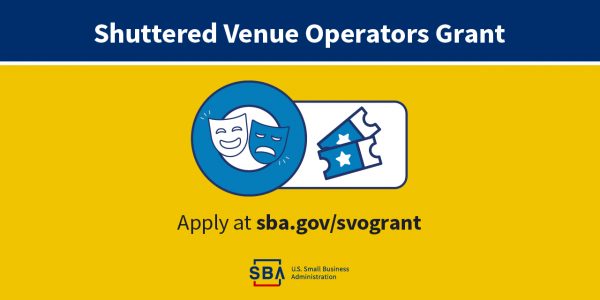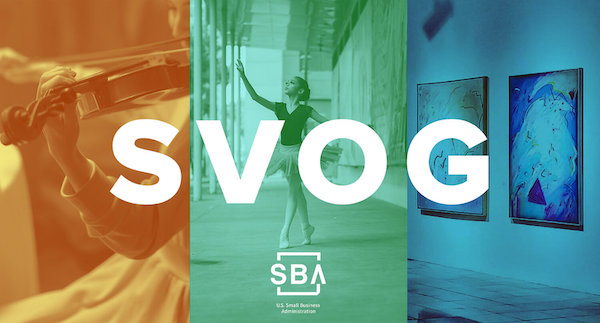Arts Commentary: Small Business Administration — Cut the Red Tape and Distribute Fed Money to Shuttered Venues!
By Steve Provizer
Boston’s independent theaters and music venues are joining thousands from around the country to call on the Small Business Administration to immediately release Shuttered Venue Operators Grant funds.

On one side we have Congress; on the other, thousands of at-risk arts venues around the country. In between, in what is an increasingly uncomfortable situation, sits the Small Business Administation (SBA). This unlikely triangle was created by the Shuttered Venue Operators Grant, a potentially vital influx of money whose distribution is being severely impeded by red tape and bureaucratic snarls. Why? Much of the problem was built into the process — by deciding to select the SBA to administer the program.
Some of the facts in play are clear-cut and some are in dispute. In December, Congress passed and the President signed a bill providing $16.1 billion dollars to eligible movie theaters, live venue operators and promoters, talent representatives, and performing arts organizations that were crippled by the pandemic. The SBA was supposed to set up an online portal to accept applications on April 8. But there was a technical glitch, so the deadline was moved to April 24.
In a press release, an association of venue operators association is calling on the SBA “to immediately fully fund all Shuttered Venue Operators Grant (SVOG) eligible entities and to immediately resolve interagency issues that have proven a barrier to funding for SVOG applicants…The SBA said that by June 9, it would distribute grants to more than 4,910 independent venues that suffered a 90% or more loss in revenue during the pandemic [Note: I can’t find a second source that will verify that the SBA ever made this “promise.”] “So far, only 90 grants have been approved and it does not appear anyone has received the money. In Massachusetts, only three businesses have been notified that they have received a grant.”
When presented with this claim, SBA New England Regional Communications Director Elizabeth Moisuk sent back this reply: “The Shuttered Venue Operators Grant program has awarded nearly $128 million to date.” Casting doubt on this figure, the Journal of Accountancy reports: “Shuttered Venue Operator Grants totaling $54.2 million had been awarded to 50 recipients through midday Thursday [June 3], the U.S. Small Business Administration (SBA) reported.” So, it is a puzzle — what is the amount that has actually been awarded? In either case, the stated amounts are a miniscule percentage of the appropriated $16.1 billion.
The SBA’s statement itself obliquely alludes to the idea that they might not have been the ideal administrators of this project: “In large part…because of statutory requirements — created in the last Administration — the applications require extensive scrutiny and applicants must submit anywhere from 30 to 100 documents in order to be considered…The program was not afforded the flexibility to decide who runs it and was hampered by red tape forcing the agency to at times manually review dozens of documents for a single application. Unlike the Restaurant Revitalization Fund, which the Administrator placed in the Office of Capital Access, and which operates more like a direct payment program.”
The statement also details the various ameliorative steps the SBA is taking to expedite the process, including re-allocating staff and making ”critical new top-to-bottom personnel changes in staffing.” The agency has also changed how it implements Do Not Pay, a fraud prevention measure. According to the SBA, that will clear holds on approximately 500 applications. The SBA is offering assistance when it comes to satisfying the IRS aspects of the application, and is implementing “commonly used technology…”
Despite the complicated nature of the application process, which the SBA is acknowledging in order to rationalize their slow response, Billboard magazine reports that over 7,750 independent music venues and talent organizations have managed to apply for a grant. If you include non-musical venues, the total is 10,300. Another 12,238 applications are in the pipeline, but are unfinished.

Rather than the SBA mismanaging the process, as has been charged, it appears the agency was handed an assignment whose scope and level of complication it simply could not handle.
A report from the Congressional Research Service (CRS) confirms this perspective: “The SBA does not have directly comparable experience administering grants to for-profit businesses. As such, the agency does not have as many analogous programs or precedents to expedite the development of the SVOG program.” The CRS explains that the SBA’s software was for loans, not grants. The agency had to be overhauled to make that change. The CRS report concludes: “The SBA has relatively little experience, let alone systems in place, to administer a grant program to a large number of for-profit and nonprofit entities.”
Senators Marco Rubio, Jim Risch, and Mitt Romney sent a letter to the SBA on January 16 urging that the agency include minor league sports venues in the SVOG program, a request that the SBA denied. So at least we know they got one thing right.
In fairness though, it seems as though the SBA is trying to respond to the franchise it’s been given. Still, despite that effort, I see no reason to think that the rate in which applications are processed and money distributed will accelerate. There is no doubt that many venues, because of the delay, will be hard pressed to keep landlords and utility companies at bay. Help, if it does come, will come too late.
Postscript: Pressure has been building on many fronts (including this one) for the SBA to get off the mark. There are still massive issues, including applicants being labeled as deceased. According to the New York Times: “the agency has acknowledged that the problem seemed to be a result of conflicts between employee identification numbers, which apply to businesses and nonprofit groups, and Social Security numbers, which apply to individuals. If a company has the same employee identification number as a dead person, the agency flagged that application as flawed [i.e., dead].”
Steve Provizer writes on a range of subjects, most often the arts. He is a musician and blogs about jazz here.
